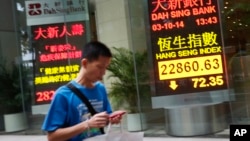The official China National Tourism Administration is barring mainland tour groups from traveling to Hong Kong. Wednesday's edict marks a strategic shift in the way Beijing is attempting to rein in and, analysts suggest, sow division, in the Hong Kong special administrative region, where democracy protests are growing by the day.
More than 40 million mainlanders cross the border into Hong Kong each year, making them the city’s largest group of visitors by far. Travel Industry Council executive director Joseph Tung said while non-Chinese tourists are opting to stay away from Hong Kong at this sensitive time, Wednesday’s announcement is a blow for the local tourism sector.
“The number of groups is around 300 [mainland] groups arriving a day; but, according to the information we received - although this is not confirmed because we do not have the [official] document from mainland China agents - they received instruction to stop promoting tours to Hong Kong,” said Tung.
Michael DeGolyer, director of the Hong Kong Transition Project, forecast the ban just hours before it became public. It forms part of what he calls the Anaconda scenario - the slow strangulation of the Hong Kong democracy movement.
The slump in the tourist trade will lead to service sector job cuts - perhaps as early as next week - pressure on the Hong Kong dollar and the potential de-listing of companies from the Hang Seng market as global confidence falters in the local economy.
“The objective or strategy is to increasingly turn the population against the students or the leaders of Occupy Central because of this slowly increasing economic pain. And so there are various ways, without resorting to tear gas and force, of increasing the pressure on students and supporters of Occupy Central to back down,” said DeGolyer.
Out on the streets, the activists - weary but resolute - express their solidarity with the Hong Kong people, but remain unmoved by Beijing’s action.
Many view the move as just another attempt by China to keep news about the democracy movement from seeping back across the border.
Tourism contributes less than 5 percent to Hong Kong gross domestic product and only 30 percent of Chinese visitors arrive in organized tour parties, said activist Bernard Luk, who is resting atop a barricade with friends.
“When mainland tourists come down to Hong Kong, they spend their money on luxury hotels, Gucci handbags, iPhones, which contributes to the Hong Kong economy, but not directly. Do you see? All this money goes back to Gucci and Apple. It will have a very, very small effect on the grassroots,” said Luk.
If Beijing chose, it could impose a far harsher economic punishment on citizens of its semi-autonomous region, which is largely dependent on the mainland for food and water supplies. DeGolyer describes this as the “Sun Tzu Scenario,” after the author of The Art of War.
“If they really wanted to make Hong Kong surrender without firing a shot, they could simply say, ‘Okay, we’re going to give you complete autonomy - no water, no mainland transport, no ships, no aircraft.’ And after a week to 10 days ask, ‘Okay; just how much autonomy do you want?’” said DeGolyer.
While the strategizing in Beijing continues, the standoff between authorities and the protesters becomes more intractable. And with each passing day, the next generation of Hong Kong citizens becomes increasingly disenchanted with its nation’s leaders.




